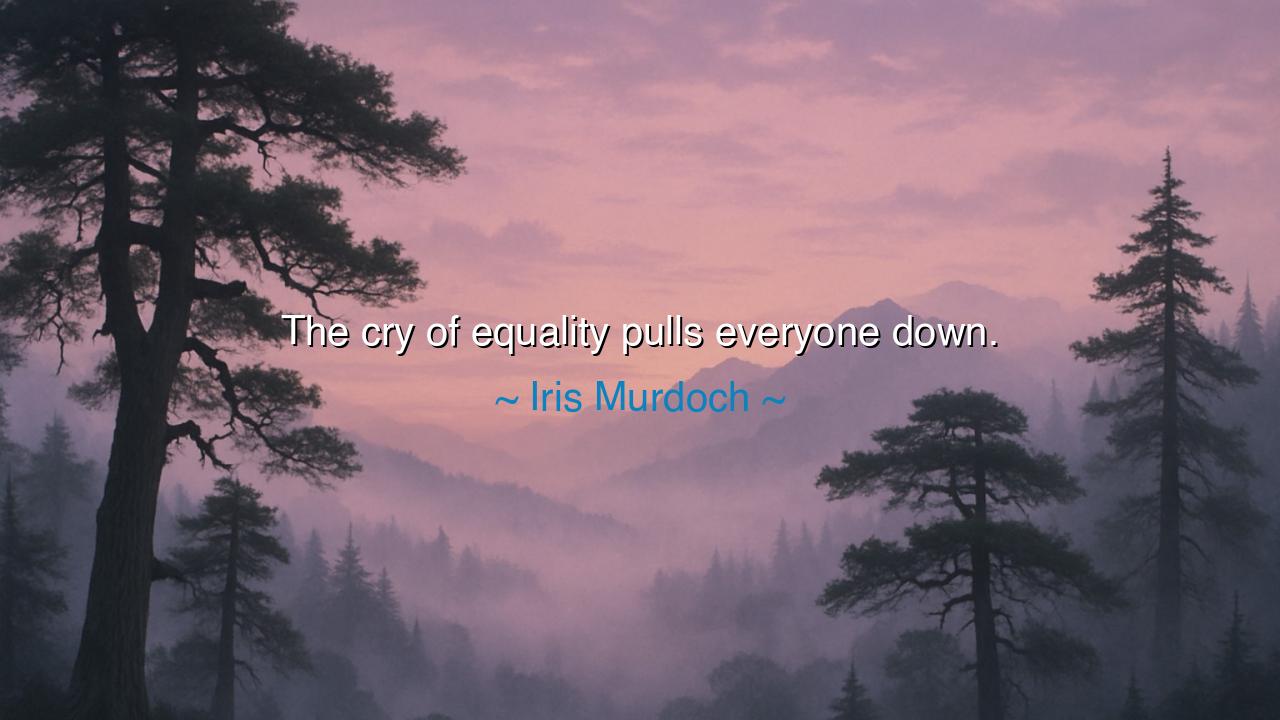
The cry of equality pulls everyone down.






The words of Iris Murdoch, philosopher and novelist, fall heavy and sharp: “The cry of equality pulls everyone down.” At first, the phrase seems to wound the spirit of justice, for who among us does not yearn for fairness? But Murdoch, with her fierce eye for truth, warns us of the shadow side of equality. She shows us that when equality is pursued without wisdom, when it is demanded in envy or in bitterness, it may drag all souls to a lower ground, where no one may rise above, and no one may flourish in the fullness of their gifts. The cry is noble, but without balance it becomes a chain.
In her words we hear an ancient truth: equality is a double-edged sword. It can free the oppressed, but it can also crush excellence if misused. To cry for equality in love, in dignity, in protection—this is just and holy. But to cry for equality in achievement, in talent, in the mysteries of the human soul—this is folly, for it denies the uniqueness of each spirit. Murdoch’s warning is not against equality itself, but against its distortion: when the demand becomes so loud that it silences individuality, it strips the world of greatness, and in trying to make all the same, it diminishes all.
History bears witness to this truth. Consider the French Revolution, where the cry of equality filled the streets. At first, it was a cry for justice, for bread, for dignity denied by kings. But soon, the cry turned wild, devouring even those who first raised it. Robespierre and the Jacobins declared that no man should rise above another, and in their fury, they cut down nobles, priests, even fellow revolutionaries. In the end, the cry of equality pulled the nation into terror, leaving not harmony but ashes. What began as a noble yearning fell into ruin because it sought to level by destruction, not to raise by justice.
Yet we must not misunderstand Murdoch. She does not call us to abandon equality, but to temper it with wisdom. She invites us to recognize that true justice is not sameness, but balance. Equality is not about dragging down the tall to match the small, but about lifting up the bowed so they may stand upright. If we mistake equality for sameness, we will extinguish the fire of genius, silence the voice of the prophet, and bury the seeds of greatness that rise unevenly but gloriously among us.
The deeper teaching is this: envy often wears the mask of justice. When one sees another higher, brighter, more accomplished, the easy cry is “equality!” But often this cry is not to raise oneself, but to lower the other. Thus, Murdoch warns us to guard our hearts: do not use the sacred banner of equality to conceal bitterness. Instead, strive for justice that uplifts without destroying, that recognizes both the dignity we share and the gifts that make us different.
The lesson for our lives is plain. When you cry for equality, ask yourself: do I wish to raise the low, or to drag down the high? Do I seek fairness, or do I seek vengeance for my envy? In your homes, your communities, your work, strive to lift others without stifling their light. Celebrate the unique gifts of each soul, even if they surpass your own. True equality is not sameness—it is the recognition that every soul has worth, even when its path and power are different.
Practical wisdom flows from this: defend equality in dignity, in opportunity, in freedom. But do not confuse it with equality in outcome or in talent. Let the poet soar higher, let the laborer work with strength, let the child dream without limit. The cry of equality must not pull down the mighty, but pull up the downtrodden. This is how harmony is built—not through leveling, but through balance.
Thus, let Murdoch’s words endure as a stern yet luminous guide: beware the cry that demands sameness, for it impoverishes all. Seek instead the equality that honors dignity while cherishing difference. In this lies the true art of justice: not to pull everyone down, but to raise all into the light, where each shines in their own way, and none are forgotten.






AAdministratorAdministrator
Welcome, honored guests. Please leave a comment, we will respond soon